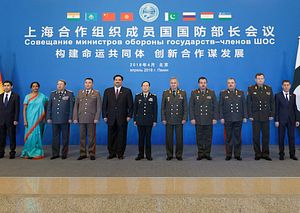On April 24, the defense ministers from the member states of the Shanghai Cooperation Organization (SCO) – China, India, Kazakhstan, Kyrgyzstan, Pakistan, Russia, Tajikistan, and Uzbekistan – gathered in Beijing for the 15th SCO Defense Ministers’ Meeting. Notably, it was the first time India and Pakistan’s defense ministers participated as full members. The two neighbors and rivals joined the SCO last year.
India-Pakistan relations, always tense, are currently in the midst of a particularly rough spot. A brief flirtation with detente came to an abrupt halt in January 2016, when India accused Pakistan of supporting militants in a deadly attack on an Indian air station in Pathankot. Since then, dialogue has fallen apart and tensions have skyrocketed. In particular, there’s been a marked increase in the number of shelling incidents across the Line of Control that forms their de facto border in the Kashmir region. As Qadri Inzamam and Haziq Qadri reported for The Diplomat, “In 2017, as many as 12 civilians were killed and 79 injured due to cross-border firing, Indian official records claim. In January [2018] alone, eight civilians lost their lives to cross-border shelling and as many as 58 were injured.”
Given the state of their relationship, there has been concern that India-Pakistan tensions could derail the SCO, particularly given that the regional grouping takes anti-terrorism as a major focus. India and Pakistan both accuse each other of fostering terrorist groups that conduct attacks across the border, making counterterrorism a sore spot in their relationship. However, India and Pakistan had both pledged to fully participate in the security meetings affiliated with the SCO, including joint military drills, leading to hopes that the SCO framework could provide a breakthrough in the current deadlock.
India was represented at Tuesday’s meeting by Defense Minister Nirmala Sitharaman, Pakistan by Defense Minister Khurram Dastgir-Khan. While each minister held bilateral talks with other SCO members, including host Wei Fenghe, China’s defense minister, there was no India-Pakistan bilateral defense meeting.
In his keynote speech at the meeting, Wei reiterated China’s push for “building a community with a shared future for mankind,” and said that security cooperation was a “top priority” for Xi Jinping in this regard. He urged the defense ministers to “constantly improve the level of defense and security cooperation,” mentioning in particular high-level exchanges, joint military drills, and education as areas of focus.
He also called for the creation of a “united front in the fight against terrorism,” which will be much easier said than done. Shortly before the SCO Defense Ministers’ Meeting, Indian Prime Minister Narendra Modi called Pakistan a “terror export factory” in remarks from London. That sparked a rebuke from China, which considers Pakistan an “all-weather friend.”
In her remarks, Sitharaman was more subtle than Modi had been, but her call for “member countries to closely coordinate and adopt a policy of zero tolerance towards terrorism” was undoubtedly a dig at Pakistan.
Sitharaman “contended that arguments of political convenience to provide an alibi for terrorist groups or organizations that support terrorism through material support or otherwise are no longer tolerable,” India’s Ministry of Defense said in a press release. “Indeed, as the world has now realized, there are no good terrorists,” a reference to Pakistan’s “good terrorist, bad terrorist” logic.
However, Sitharaman also pledged that “India will engage with a positive approach and an open mind on all issues related to defense cooperation within the SCO framework.” Likewise, Pakistan’s Dastgir promised that any bilateral issues would not be allowed to impede the group’s cooperation.
Both India and Pakistan, along with the rest of the SCO member states, are expected to participate in the Peace Mission joint military exercises, to be held in Russia this August.
Beyond counterterrorism, the grouping discussed regional issues, with a focus on the security situation in Afghanistan. Russia’s defense minister also weighed in on the Syria crisis, alleging that a recent chemical attack in Ghouta was “obviously staged.” The United States, U.K., and France had blamed the Assad government for the attack and conducted air strikes in retaliation.
The SCO also launched a new Expert Working Group to coordinate deeper defense cooperation.
The SCO Foreign Ministers’ Meeting took place in Beijing alongside the defense meeting. The main task for the foreign ministers was to finalize preparations for the annual SCO summit, to be held in Qingdao, China this year from June 9 to 10.

































